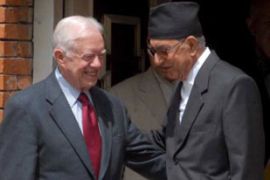Nepal king further sidelined
Parliament passes amendment that allows legislators to abolish monarchy.

Published On 14 Jun 2007
King Gyanendra, Nepal’s monarch, has already been stripped of his roles as head of state and army chief after protests in April 2006 forced him to end a 14-month period of emergency rule.
Stoned by protesters
Once widely revered in his kingdom, he now appears only rarely in public and his vehicle was stoned by protesters in March at a religious festival in Kathmandu, Nepal’s capital.
Nepal’s Maoists have been allotted 83 seats in the 330-seat interim parliament, and in April took five ministerial portfolios.
They continue, though, to face accusations of resorting to violence and remain on a US list of terrorist organisations. Constituent assembly polls have also been pushed back from June to November due to a lack of preparation.
C K Lal, a political analyst who writes for the Nepal Times, said Wednesday’s amendment “made it easier to hold the elections on time”.
But Lok Raj Baral, a retired professor of politics, said he did not believe parliament would be able to remove the monarchy before the vote.
“The decision taken by parliament is progressive, but the condition that they have put to remove the monarchy is not that convincing,” Baral said.
‘Focal point’
Meanwhile, also on Thursday, Jimmy Carter, a former US president who is currently on a visit to Nepal, praised the peace process and said Girija Prasad Koirala, Nepal’s prime minister, was his “hero”.
Carter said he had a good meeting with Koirala who “has been a hero for me with his reputation and his integrity”.
“He has been the focal point around which the peace and future democracy of this country has been built,” Carter said.
Koirala has been credited with leading the pro-democracy movement against Gyanendra and persuading the Maoists to join the peace process.
Source: News Agencies